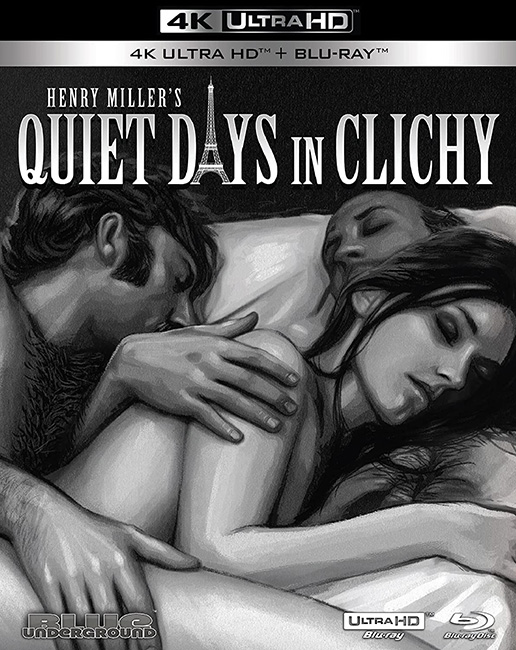Joey and Carl are two down and out reprobates- oops, I mean writers in Paris. These two walking hard-ons get into all sorts of ridiculous and impossible shenanigans involving sex, food, and money. Sometimes, all three at the same time. There are lots of beautiful women that come and go, and they are all treated like trash by Joey and Carl. And that, my friends, is Quiet Days in Clichy (1970). Good times!
I don’t know if this is a thing to brag about or not, but I have read a lot of Henry Miller. And I mean A LOT a lot. His work spoke to me in my youth on a level that I didn’t know I needed to hear. (I’m still not sure what that says about me.) Weirdly, I never got around to reading Quiet Days in Clichy. Maybe I was thinking, “You know what, I’ll just watch the movie.” No, I wasn’t thinking that. I don’t think any Henry Miller fan has ever said that or will ever say that. My favorite part of the Mondo Digital review of this film was they said that Miller’s work is “unfilmable”. That made me laugh.
Like much of Henry Miller’s work, Quiet Days in Clichy is equal parts poetry, comedy, sex, and just gross stuff. The things that filmmakers don’t explore enough for my nitpicky Miller fandom is his lust for not just the C word, but for art, literature, big ideas, and intellectual exploration. I always found the guy’s work truly inspiring, and it instilled in me a drive to explore beyond my meager understanding of life, philosophy, etc. So yeah, that stuff is frankly not cinematic. I will say that seeing Joey give all of his money to a woman for sex, run around Paris grumbling about it, and then eat scraps out of a garbage can is very on brand for Henry Miller.
The biggest star of Quiet Days in Clichy is its theme song by Country Joe MacDonald. It is wildly irritating and thankfully, is not catchy at all. So, it’s happily not stuck in my head at the moment. The rest of the soundtrack, however, works rather well with its mishmash of jazz, folk, and acid rock. There are moments where the keen eye of the cinematographer and the choice of music hit just right, and I forgot that I was watching a movie that I couldn’t wait to be over.
Aside from one particular up close and… um… penetrative moment in the film, Quiet Days in Clichy is a lot of softcore sex and raunchy talking. That stuff isn’t really what I look for in an evening’s entertainment, but the excellent travelogue scenes and the wistful cinematography featuring Paris in the late 1960s are almost worth the price of admission. The rest is just hippy dippy chauvinistic and pretentious trash that I could do without. There are genuinely funny moments in this and a playful pop art style that I wish had been explored more thoroughly. But in the end, this is little more than a grubby oddity that will likely not appeal to fans of Henry Miller’s work or most other people.
Oh yeah, there’s a whole sequence where Carl sings the praises of a girl he has found wandering the streets that is just dreadful. When it’s revealed what her age is supposed to be, my stomach lurched. And I don’t mean that she’s too old. That will likely be a dealbreaker for most viewers (as it should be). Just a heads up.
While I don’t own a 4K player (like all the real Henry Miller fans do), I am very impressed with the Blu-ray that comes with the two-disc set from Blue Underground. The movie looks absolutely beautiful. The extras on the disc are an interview with Country Joe MacDonald. He opened the interview by singing the song, so I shoved my remote control into my ear. There is a fascinating interview with Henry Miller’s publisher and friend Barney Rossett that I wish was longer. There is a clip from the old Midnight Blue public access show where Rossett is interviewed by walking trash bag Al Goldstein. Pass! There is also a deleted scene, a trailer for the film, poster and still gallery, a book cover gallery, and the court documents from when this film was banned.

